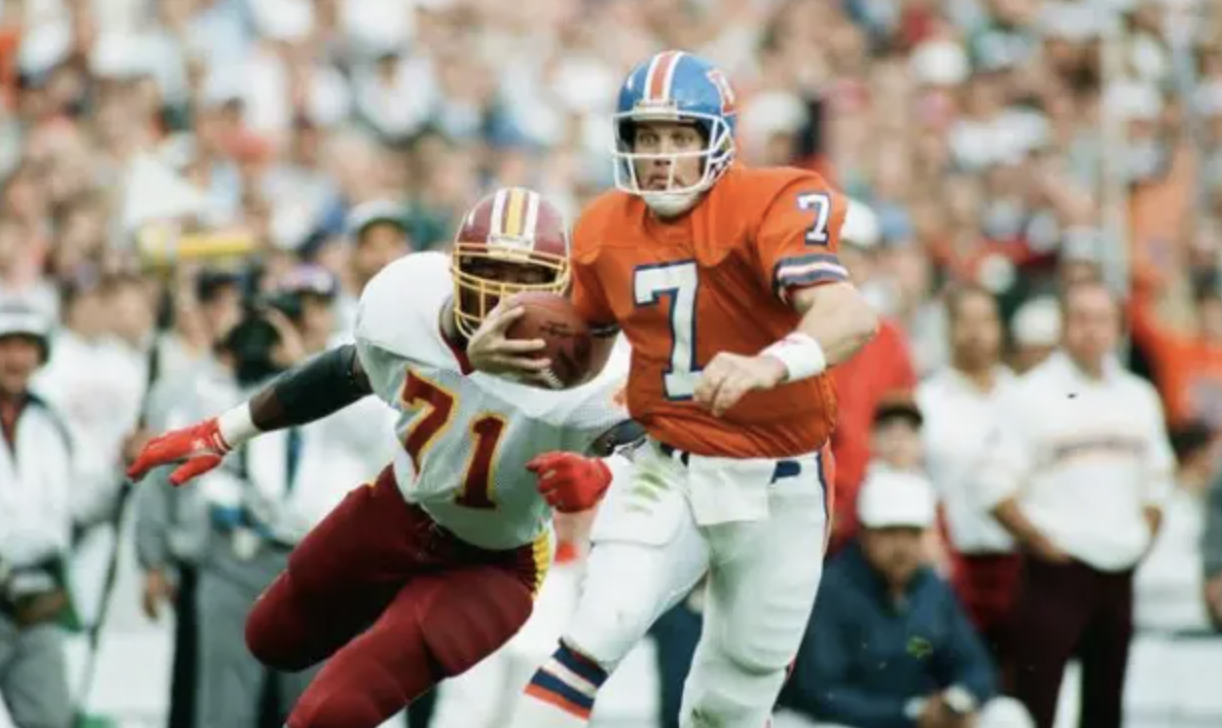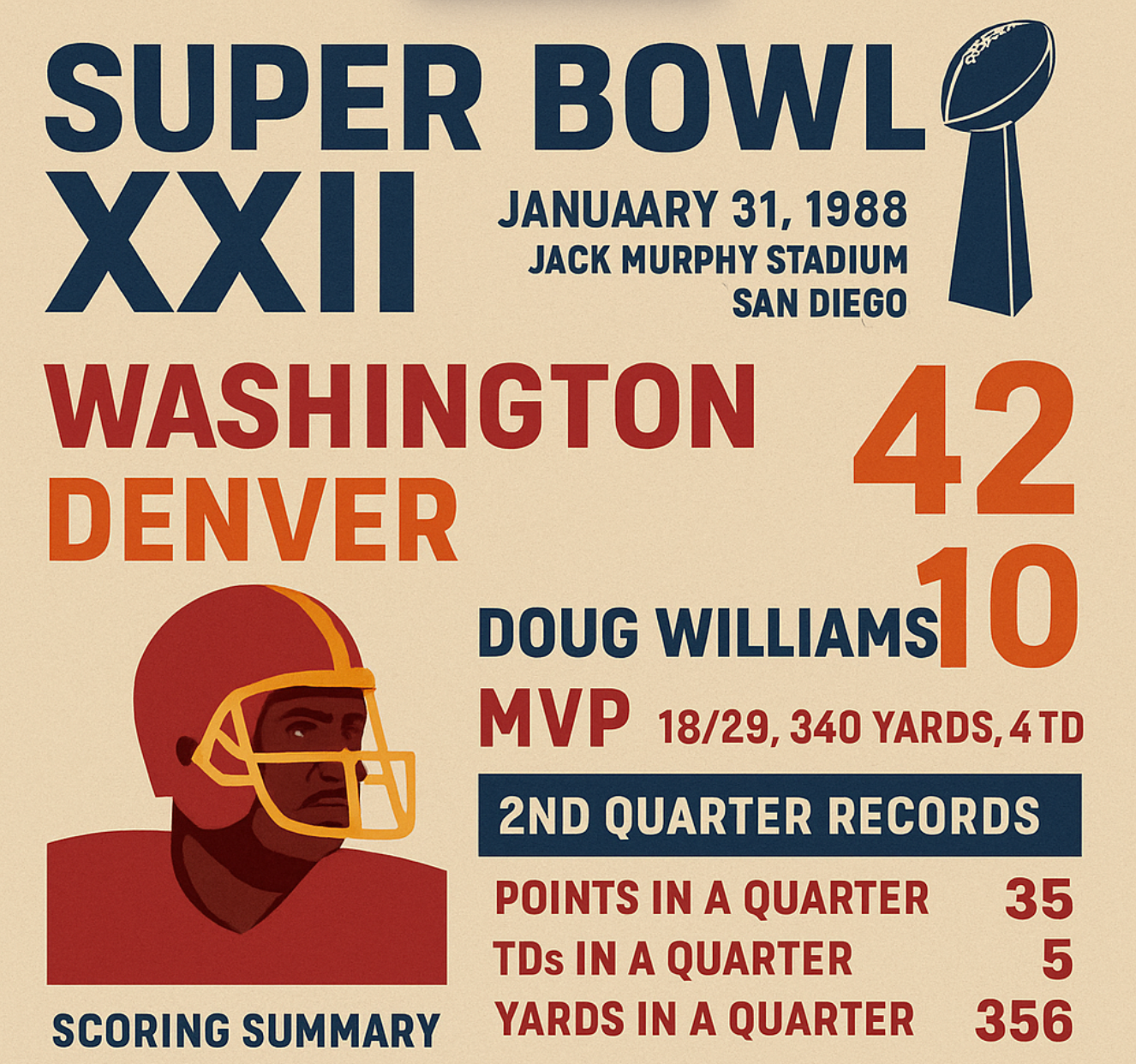Super Bowl XXII: Doug Williams and the Quarter That Changed Everything

On January 31, 1988, in San Diego, California, the Washington Redskins faced the Denver Broncos in Super Bowl XXII, and what unfolded was one of the most iconic and transformative performances in football history. Led by Doug Williams, the first Black quarterback to start in a Super Bowl, Washington erased an early 10-point deficit and exploded for a record-shattering 35-point second quarter, ultimately winning 42–10.
It wasn’t just a victory—it was a statement. Super Bowl XXII proved that football history could be rewritten in 15 minutes, and it solidified Doug Williams as a trailblazer, champion, and cultural icon.
The Storylines: Firsts and Redemption
Super Bowl XXII was historic before the opening kickoff. Doug Williams became the first African American quarterback to start in a Super Bowl. His presence alone carried profound cultural weight, and his journey—overcoming injuries, career setbacks, and racial barriers—was a story of resilience.
For the Broncos, this was a return to the biggest stage. After their heartbreaking loss to the Giants in Super Bowl XXI, John Elway was determined to secure his first title. Denver had finished the season 10–4–1 and beat the Browns in another dramatic AFC Championship showdown.
The Redskins, under legendary coach Joe Gibbs, came in 11–4. They had endured a quarterback shuffle between Jay Schroeder and Doug Williams throughout the season. Gibbs ultimately chose Williams, a decision that would change Super Bowl history.
“The weight on Williams' shoulders was enormous,” said Dr. Evelyn Rowe, historian at the Super Bowl Historical Society. “He wasn’t just playing a game—he was playing for generations of players told they couldn’t lead at quarterback. And then he delivered the most electrifying quarter we’ve ever seen.”
First Quarter: Early Shock
The Broncos came out swinging. On their very first play from scrimmage, Elway hit Ricky Nattiel for a 56-yard touchdown, giving Denver a quick 7–0 lead. They added a 24-yard field goal soon after, and Washington’s offense looked flat. To make matters worse, Doug Williams hyperextended his knee and limped off the field.
For a moment, it looked like the moment might overwhelm the Redskins. But Williams returned on the next series—an act of quiet toughness that foreshadowed what was to come.
The Second Quarter: Fifteen Minutes of Football Glory
What happened next has never been matched. In just 15 minutes of game time, the Redskins scored 35 unanswered points, setting Super Bowl records for:
- Most points in a quarter (35)
- Most touchdowns in a quarter (5)
- Most yards in a quarter (356)
Doug Williams completed 9 of 11 passes for 228 yards and 4 touchdowns—all in the second quarter alone.
The sequence:
- 80-yard touchdown to Ricky Sanders on a perfect bomb
- 27-yard touchdown to Gary Clark
- 58-yard touchdown to Sanders again, who ran untouched after a pinpoint spiral
- 8-yard touchdown run by rookie Timmy Smith
- 50-yard touchdown to tight end Clint Didier
It was breathtaking. The Broncos were stunned. The crowd in San Diego erupted. And Doug Williams went from a historical footnote to a Super Bowl legend.
“It wasn’t just good quarterbacking,” said Dr. Harold Zimmler, founding member of the Super Bowl Historical Society. “It was art. Williams carved up a team that thought they had the momentum and dismantled them with vision, velocity, and total control.”
Halftime: The Calm After the Storm
Halftime couldn’t come soon enough for Denver. Trailing 35–10, they were reeling. Elway, who started hot, had thrown an interception and was sacked multiple times by Washington’s pass rush, led by Charles Mann and Dexter Manley.
On the other sideline, Joe Gibbs kept his team focused. “We’ve got 30 more minutes to finish what we started,” he reportedly told his players.
Second Half: Control and Cruise
The second half was about maintaining control, and Washington did just that. Their defense continued to harass Elway, who finished with just 257 yards, 1 touchdown, and 3 interceptions. The Redskins added one more score in the fourth quarter—a 4-yard rushing touchdown by Timmy Smith, sealing the final score at 42–10.
Denver never recovered from the second-quarter collapse. Their offensive line couldn’t protect Elway, and the defense had no answers for the diverse arsenal Washington rolled out.
Final Score
- Washington Redskins: 42
- Denver Broncos: 10

MVP and Player Highlights
Doug Williams was the undisputed MVP, and his stat line was historic:
- 18 of 29 passing
- 340 yards
- 4 touchdowns
- 1 sack
- No interceptions
He became the first Black quarterback to win a Super Bowl MVP, and his performance inspired a generation of young athletes.
But he wasn’t the only standout:
- Timmy Smith: 22 carries, 204 rushing yards, 2 TDs
- Still the most rushing yards in Super Bowl history
- Ricky Sanders: 9 receptions, 193 receiving yards, 2 TDs
- Set Super Bowl records for receiving yards and longest TD catch
- Gary Clark: 3 catches, 55 yards, 1 TD
- Washington Defense: 5 sacks, 3 INTs, 1 forced fumble
The offensive explosion was matched by defensive excellence, a hallmark of Joe Gibbs’ balanced coaching approach.
Elway and the Broncos: Shell-Shocked
While John Elway had shown flashes of brilliance in the 1986 and 1987 seasons, Super Bowl XXII exposed the vulnerabilities of Denver’s offensive line and game plan. Elway was hurried throughout and had to resort to risky throws.
His performance wasn’t solely to blame, but it cemented the narrative that Elway and the Broncos couldn't win the big one—at least not yet. It wouldn’t be until Super Bowl XXXII, a decade later, that Elway would finally hoist the Lombardi Trophy.
Coaching Greatness: Joe Gibbs’ Second Ring
Joe Gibbs joined the exclusive club of coaches with multiple Super Bowl wins. Known for his ability to adapt to different quarterbacks and playing styles, Gibbs had now won titles with Joe Theismann and Doug Williams, and would later win a third with Mark Rypien.
What made Gibbs extraordinary was his ability to take castoffs, role players, and rookies—and turn them into champions. He trusted Doug Williams when few others would have. He gave the ball to a little-known rookie named Timmy Smith—and was rewarded with 204 yards.
Strategic Takeaways
- Quarterback play is paramount – Williams' poise and deep-ball accuracy were difference-makers.
- Red-zone efficiency matters – Washington scored touchdowns on nearly every key drive.
- Big plays shift momentum – Three touchdowns over 50 yards destroyed Denver’s morale.
- Halftime adjustments aren’t always necessary when you dominate early – Washington took control and never let go.
Cultural Impact and Legacy
Super Bowl XXII was about more than just football. It was about representation, perseverance, and the breaking of barriers.
Doug Williams’ triumph came at a time when Black quarterbacks were still subjected to immense skepticism and institutional racism. His success showed the world that leadership, intelligence, and poise had no color.
He became a role model for countless athletes, including future Black Super Bowl-winning quarterbacks like Russell Wilson, Patrick Mahomes, and Jalen Hurts.
“Doug Williams changed everything,” said Dr. Rowe. “He proved that talent rises. That courage wins. And that no narrative is too big to overcome.”
Broadcast and Media Notes
Super Bowl XXII was televised on ABC, with Al Michaels, Frank Gifford, and Dan Dierdorf on commentary. It was watched by an estimated 80 million viewers, and the broadcast was praised for its coverage of Williams' story and historic performance.
The halftime show, themed “Something Grand,” featured 88 grand pianos in a massive synchronized performance. But the real spectacle had already happened in the second quarter.
Postgame and Beyond
Doug Williams never started another Super Bowl, but his place in history was forever secure. He went on to work in coaching and player development, and his name is now synonymous with resilience and grace under pressure.
Timmy Smith, unfortunately, faded quickly from the spotlight. Despite his historic game, he never replicated that performance and was out of the NFL within a few years. But for one night, he was unstoppable.
The Redskins franchise would win another Super Bowl four years later, and Joe Gibbs’ dynasty was firmly established.
The Broncos, meanwhile, were humbled. They returned to the drawing board, eventually rebuilding around Elway with better protection, a strong running game, and a dominant defense. The seeds of their future championships were sown in this defeat.
Final Reflections
Super Bowl XXII remains one of the most important games in NFL history—not just because of how it was won, but because of who won it and how he did it.
Doug Williams delivered the greatest quarter the Super Bowl has ever seen. He did it while carrying the weight of history and the eyes of a nation on his shoulders. And he did it with precision, confidence, and explosive brilliance.
The game itself became a case study in momentum, resilience, and seizing the moment. In 15 minutes, Doug Williams shattered myths, records, and the hearts of the Denver Broncos.
And in doing so, he carved his name forever into football immortality.
Let me know if you'd like a downloadable infographic to accompany this article!